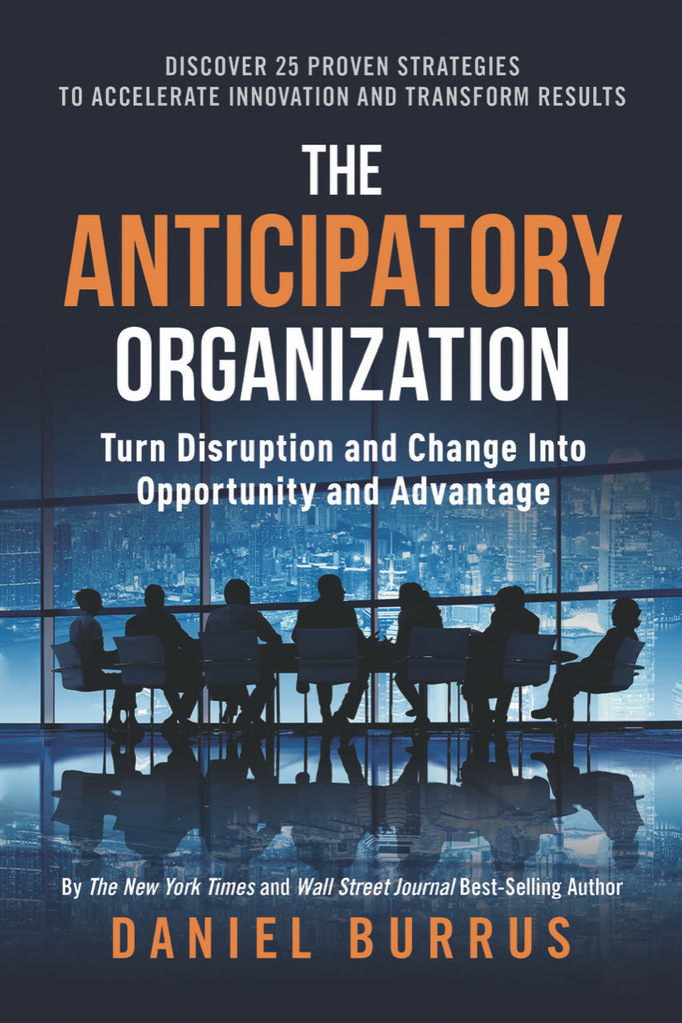Back in 1960, when I bought a small envelope company with dreams of becoming a gazillionaire, I could not imagine a world where people just turned on a machine, clicked through some instructions, and paid the electric bill.
I didn’t think that I could have a contract signed and returned to me in a few minutes instead of dropping a paper document in the mail, which would take a few days. I was operating in a time when catalog orders went into an envelope back to the retailer to be processed.
In other words, I didn’t anticipate the changes ahead – and neither did my competitors. Had I read a book like Daniel Burrus’ “The Anticipatory Organization,” I might have considered investing in developing computer technology.
But over the years I wised up and learned to follow trends, even predict a few. Perhaps a little late to the party with some of that wisdom, but it made a big difference when I could start to see what was coming my way.
“Organizations of all types and sizes have traditionally relied on their ability to react as quickly as possible to shifting challenges, the demands of the marketplace, and other types of disruptions,” Burrus says. “That’s often referred to as agility.
“Being agile is very important, but it is simply no longer good enough,” he continues. “We are living in an era of accelerating disruption – not simple change, but outright systems and modes of thinking less relevant and even obsolete at an increasing pace.”
So he asks, “Would you rather have merely reacted as quickly as possible as change took place or anticipated it and crafted well-thought-out plans to take advantage of its game-changing opportunities?”
Burrus cites plenty of very recognizable examples to back up his theory. For instance, he tells about the introduction of the iPhone. Reporters asked the CEO of BlackBerry, which then dominated the cell phone market, if he was concerned about a threat to his business. His response might amuse us today. He didn’t think anyone would want to watch a video on a phone, and couldn’t imagine the appeal of watching on such a small screen. As of November 2018, the last time Apple released sales figures, more than 2.2 billion iPhones had been sold worldwide.
When you adopt an anticipatory mindset, you learn not to focus on your competition. When you do that, Burrus says, you will be tempted to adopt or adapt what they do and look like them. Instead of imitating, you learn to innovate by intentionally focusing on what the competition is not doing.
Consider this: Only four companies that made the Fortune 500 top 10 list 20 years ago remained on the list last year. Apple and Amazon are on the current list, but they weren’t there just 10 years ago even though both were in existence. Certainly there were computers, cell phones and bookstores aplenty during that time span. But they didn’t adapt to get ahead of trends.
I’ll be the first to acknowledge that sometimes, just keeping up with trends takes an enormous amount of energy. As I mentioned earlier, envelopes seemed to be a pretty safe commodity when I went into business. Fax machines emerged as a threat to paper transactions, and then email and texting. Automatic bill paying, the decline of direct mail and online ordering cut further into our industry. We’ve had to reinvent ourselves time and time again, and I’m fairly certain that we will continue to do that as long as we are in existence.
As Burrus points out, “We’re going to be spending the rest of our lives in the future. Given that reality, why do we spend such little time or energy trying to anticipate what it has in store for us?”
He also emphasizes that “the number one certainty in this world is that the future is all about relationships . . . all the technology in the world is secondary to interaction between people – constructive, trust-based interaction. Without that, what good is the most amazing technology?”
That’s music to my ears. I never want to be part of a business that puts technology ahead of people. I love interacting with my employees, customers and even competitors. That’s how I get some of my best ideas. That’s where I see my future.
If you see your future somewhere else, read and study this book. I anticipate that you’ll love it.
Mackay’s Moral: The future belongs to those who are prepared for it.
